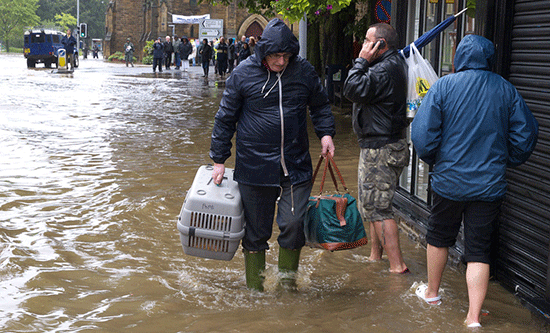
In 2019 Britain became the first major economy to pass a net-zero emissions law, aiming to be carbon neutral by 2050, and in 2020 it declared the sale of new petrol and diesel cars will be banned in a decade. The sectors contributing the highest number of emissions within Britain are transport, energy supply and business. Earlier this year Boris Johnson announced an additional £3bn of funding for climate change solutions, and last year he laid out his ten-point plan to combat global warming. Britain is projected to miss its 2050 net-zero target, not simply because its targets are not ambitious enough, or because it lacks real strategy – both of which are true – but because green capitalism does not exist. Capitalism’s drive to accumulate capital will necessarily lead to further exploitation of people and the environment.
Local authority councils
As of early 2020 265 out of 408 local authority councils have declared a climate emergency. Research from the Electrical Contractors’ Association found that 166 (78%) of the 214 local councils investigated had committed to net neutral carbon emissions by 2050, and 49 (22%) by 2030. But 93 (43%) do not measure energy use of council-owned buildings and property. Furthermore, 47% do not even have a plan in place to reduce carbon emissions resulting from these built assets. This includes 11 of the councils that pledged carbon neutrality by 2030.
Manchester City Council’s plan for carbon neutrality does not include emissions from Manchester Airport. The airport declared itself carbon neutral in 2016, but only in terms of its energy consumption and does not count the 200,000 flights handled annually. The airport is predicted to more than double flights by 2050 as it competes with Heathrow. The Labour-controlled council, which partially owns the airport, is set to invest in a £50m car park in line with this expansion.
Pension funds scandal
£8.5bn of council pension funds were invested into fossil fuels in the last financial year, both increasing the value of the fund and facilitating the development of the polluting industry. The Greater Manchester pension fund invested over £1bn, Nottinghamshire £241m, and Tyne and Wear £238m. 40% of all direct investments by local council pension funds go to just three companies – BP, Shell and BHP Billiton. All three are emitting carbon emissions at a rate consistent with a global temperature increase of 2.7 degrees by 2050 and have released no plans for reducing emissions.
The environmental cost of social cleansing
Councils around the country are demolishing council houses, selling the land, and building ‘luxury’ private housing in their place. This attack on the working class has a significant environmental impact. Rubble from demolition packs landfills, and the carbon cost of the redevelopment is huge. Between 2011 and 2014 the Heygate Estate in Southwark, which accommodated more than 1,200 council homes, was destroyed.
Architectural firm Gensler proposed a refurbishment project that would have cost £35m and preserved the 1,200 homes, while bringing them up to modern environmental standards in terms of heating and insulation. Instead, the Labour-ran Southwark council sold the estate for £50m, spent £44m moving residents out, and undertook the demolition and redevelopment project which released over 40,000 tonnes of CO2 into the atmosphere.
Coal in Cumbria
At the Powering Past Coal Alliance global summit, co-hosted by the British government in March, Britain encouraged others to move away from coal power. Alok Sharma, the MP currently serving as President of the COP26, has said we ‘must consign coal power to history’. Meanwhile Cumbria County Council has approved the opening of a new coal mine. Professors Rebecca Willis and Mike Berners-Lee from Lancaster University say the mine will produce 8.4m tonnes of CO2 per year. This is the equivalent of emissions from more than one million households. Following public outcry, the Council is reviewing its decision.
Coronavirus relief for environment polluters
Under the coronavirus relief scheme set out in mid-2020 British Airways, EasyJet, and Ryanair were lent £1.8bn. The oilfield service companies Baker Hughes and Schlumberger borrowed £750m between them. Honda, Toyota, and Nissan together borrowed £1bn and Rolls-Royce alone borrowed £300m.
Britain is doing little to reduce car emissions. Grants for low-emission cars have been cut and public transport fares have risen, while the aforementioned policy to ban the sale of petrol and diesel cars by 2030 will not take cars off the road immediately. An electric car driving utopia is far off and will require increased energy production, as well as lithium to produce car batteries. As recently exposed in Declassified UK, the drive to secure lithium, and hence lead electric car production, led Britain to supporting the imperialist-backed coup in Bolivia which toppled socialist President Evo Morales in 2019. Bolivia has the second largest lithium deposits in the world.
Government figures on sectors which contribute the highest number of emissions obscure the impact of the British energy corporations and agribusiness and mining multinationals causing environmental devastation around the world. Capitalist Britain will continue to throw money at companies to make minute changes under a greenwash, while the power of these giant corporations and multinationals goes unchallenged.
Chris Robert
FIGHT RACISM! FIGHT IMPERIALISM! 281 April /May 2021




